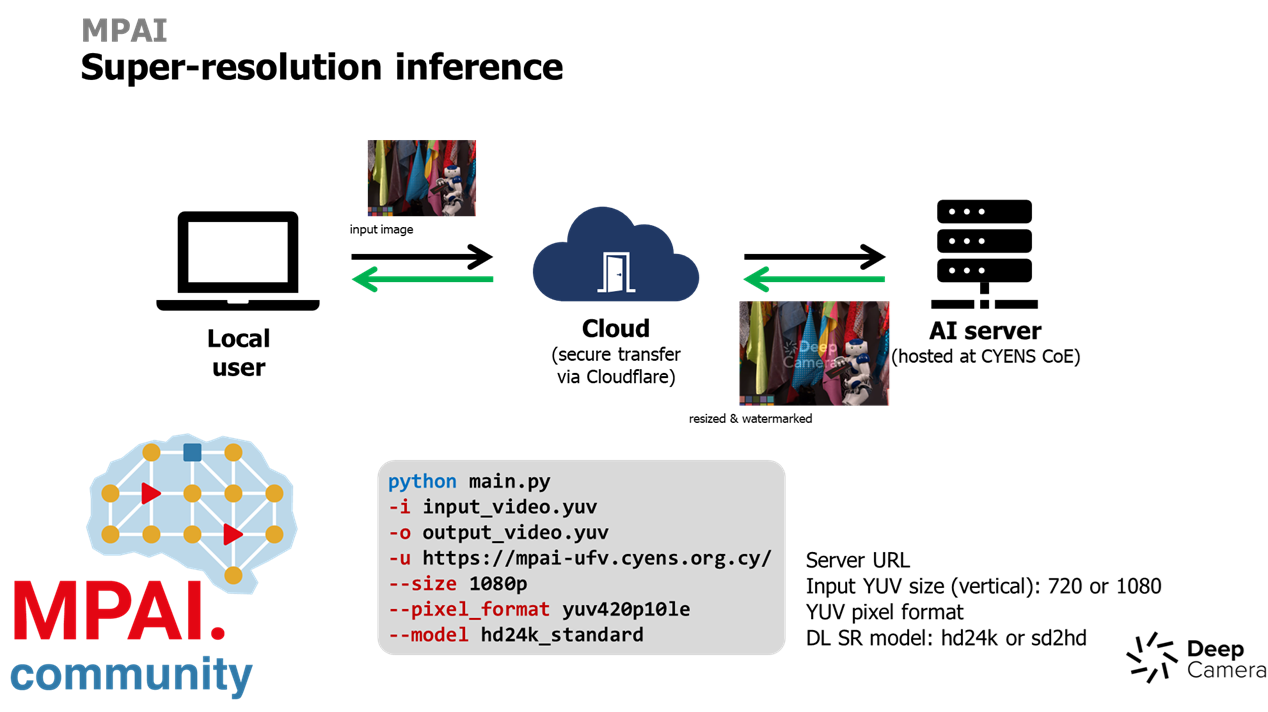Geneva, Switzerland – 26th November 2025. MPAI – Moving Picture, Audio and Data Coding by Artificial Intelligence – the international, non-profit, unaffiliated organisation developing AI-based data coding standards – has concluded its 62nd General Assembly (MPAI-62) publishing the Up-sampling Filter for Video applications standard.
Technical Specification: AI-Enhanced Video Coding (MPAI-EVC) – Up-sampling Filter for Video applications (EVC-UFV) V1.0 provides two standard methodologies 1) to design AI-based Super-resolution up-sampling filters for video applications and 2) to reduce the complexity of the designed filters without substantially affecting their performance. The parameters provided in EVC-UFV standard may be used to test the filter performance. Alternatively, an application can be used to submit an image and receive an up-sampled version of the image.
After publishing the Autonomous User Architecture Call for Technologies, MPAI has extended its Tentative Technical Specification: Pursuing Goal in metaverse (MPAI-PGM) – Autonomous User Architecture (PGM-AUA) originally attached to the Call. This addendum is a concrete example of the standard that MPAI seeks to develop with the PGM-AUA Call. Respondents to the Call are encouraged to read, comment on, change, or extend this document in their responses. Alternatively, they can submit their responses with a content unrelated to this document but relevant to the Call. The video recording of the online presentation of the Call is available. Deadline for submissions is 19 January 2026.
MPAI is continuing the development of its work plan that involves the following activities:
- AI Framework (MPAI-AIF): extending the MPAI-AIF specification to enable a client to access a remote MPAI-AIF Controller and an AI Module to communicate data to another AIM with associate metadata.
- AI for Health (AIH-HSP): developing the specification of a system receiving and processing licenses AI Health Data and enabling clients to improve health processing models via federated learning.
- Context-based Audio Enhancement (CAE-USC): developing the Audio Six Degrees of Freedom (CAE-6DF) and the Audio Object Rendering (CAE-AOR) specifications.
- Connected Autonomous Vehicle (CAV-TEC): developing a new version of the flagship specification CAV-TEC with security support.
- Compression and Understanding of Industrial Data (CUI-CPP): developing the Company Performance Prediction V2.0 specification.
- End-to-End Video Coding (MPAI-EEV): exploring the potential of AI-based End-to-End Video coding in compressing video sequences.
- AI-Enhanced Video Coding (MPAI-EVC): exploring use of AI to enhance the video codec performance.
- Governance of the MPAI Ecosystem (MPAI-GME): operating the MPAI Ecosystem per the MPAI-GME Specification.
- Human and Machine Communication (MPAI-HMC): exploring the use of AI in human-to-machine and machine-to-machine communication.
- Multimodal Conversation (MPAI-MMC): exploring the impact of the PGM-AUA Call for Technologies on human-to-machine and machine-to-machine
- MPAI Metaverse Model (MMM-TEC): developing security-protected protocols in the MMM-TEC specification.
- Neural Network Watermarking (NNW-TEC): Developing the new Neural Network Watermarking (MPAI-NNW) – Technologies (NNW-TEC) including assessments of Neural Network Traceability Technologies.
- Object and Scene Description (MPAI-OSD): discussing the impact of MPAI standards planned or under development on MPAI-OSD V1.4.
- Portable Avatar Format (MPAI-PAF): discussing the impact of MPAI standards planned or under development on MPAI-PAF V1.5.
- AI Module Profiles (MPAI-PRF): extending the scope of the current version of AI Module Profiles.
- Server-based Predictive Multiplayer Gaming (MPAI-SPG): exploring new standard opportunities in the domain.
- Data Types, Formats, and Attributes (MPAI-TFA) extending the standard to data types used by MPAI standards that are planned or under development.
- XR Venues (XRV-LTP): developing the standard for improved execution of Live Theatrical Performances using AI.
Legal entities and representatives of academic departments supporting the MPAI mission and able to contribute to the development of standards for the efficient use of data can become MPAI members. New members joining before 31st December 2025 have their membership extended until 31st December 2026.
Please visit the MPAI website, contact the MPAI Secretariat for specific information, subscribe to the MPAI Newsletter and follow MPAI on social media: LinkedIn, Twitter, Facebook, Instagram, and YouTube.


